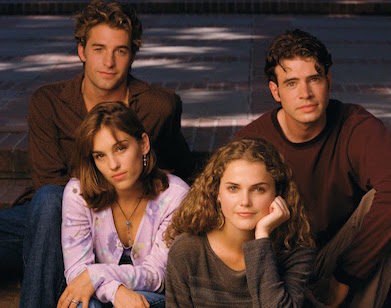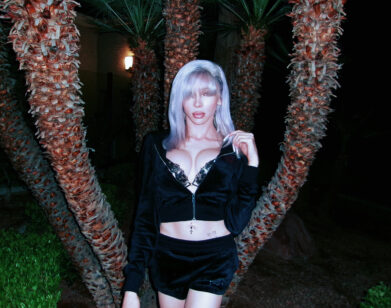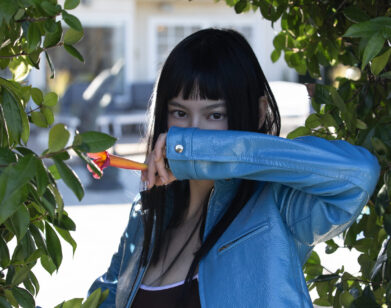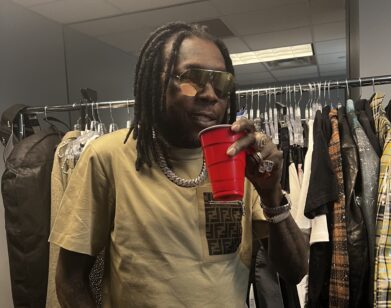music!
Adam Granduciel and Keri Russell Celebrate The War On Drugs’ New Chapter
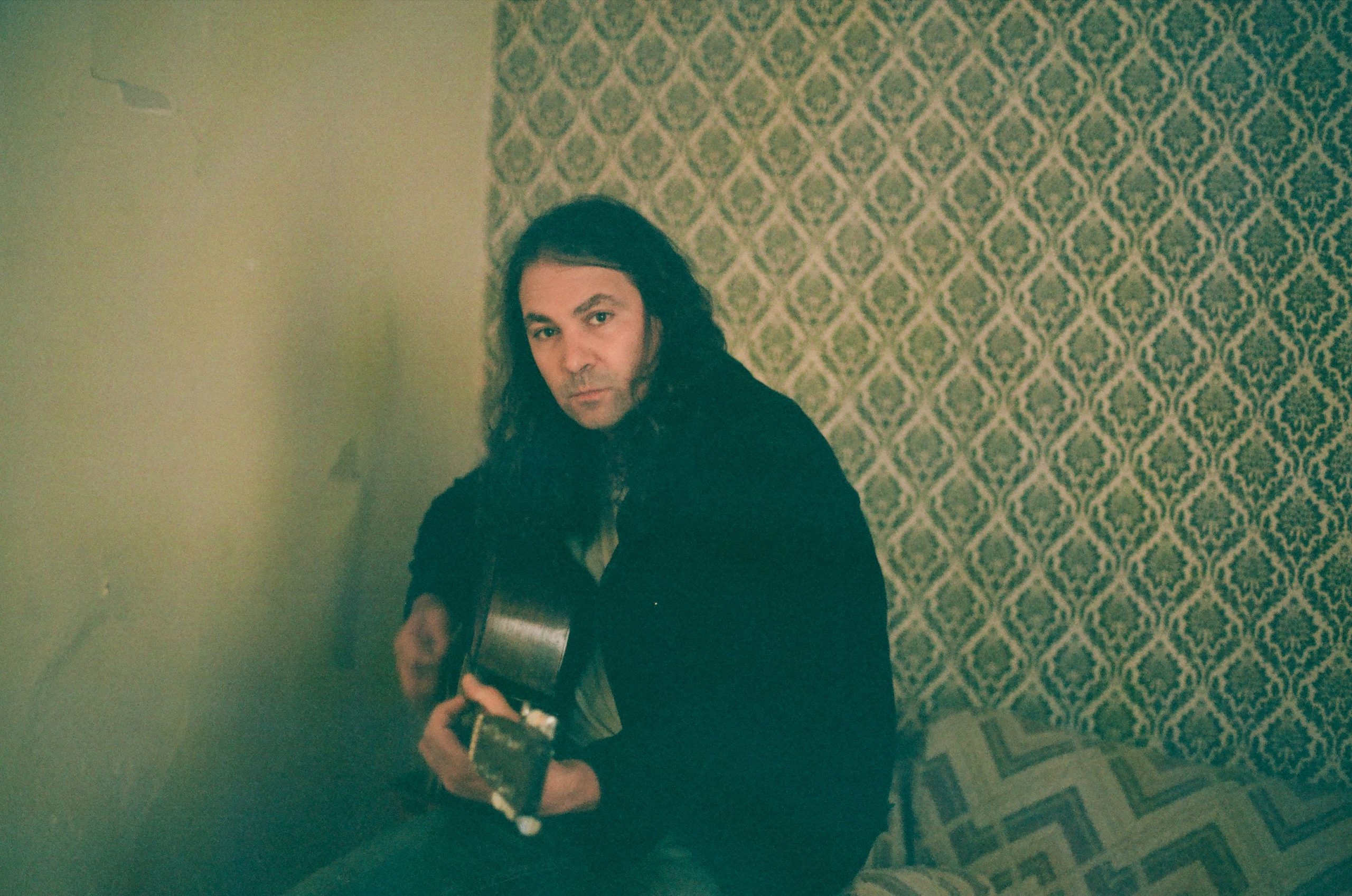
Most of us will have a War On Drugs moment at some point in our lives. Over five zeitgeist-altering albums—epic in their emotional scope and sonic depth—the Philly-born band has earned a reputation for encapsulating the near-univeral sense of uneasiness and exuberance of coming of age. Formed in 2005, the band has become a cornerstone of contemporary Americana, and has collaborated with the likes of Kurt Vile, Sharon Van Etten, and The National. For Adam Granduciel, the band’s lead guitarist and front man, shepherding The War On Drugs in its various configurations has been the singular focus of the past 15 years. “There was a beautiful aimlessness to that time,” he recalls on a recent Zoom call, “But I wouldn’t want to go back to being 23.” This shift is evident in I Don’t Live Here Anymore, the latest of the band’s five albums, out last week, which embraces a certain rock n’ roll jubilance that was scarce on previous records. The new record offers bite-sized melodies and tighter lyrics where albums like 2008’s Slave Ambient or 2010’s Lost in the Dream thrummed with expansive guitar riffs and stifled, impossible-to-encapsulate feeling. Granduciel attributes his new sound to the birth of his son, Bruce. After more than a decade of touring, fatherhood has had a clarifying effect: “I can write about the same things that I did in my 20s,” says Granduciel, “But I know what I’m singing about.” Below, the musician talks with his new friend and mega-fan, the actor Keri Russell, about his upcoming tour, the art of improvisation, and being 42.—MARA VEITCH
———
ADAM GRANDUCIEL: How’re you doing, Keri?
KERI RUSSELL: Adam, this is so cool! Where are you right now?
GRANDUCIEL: I live in Studio City, in L.A. This is my little music studio. Where are you?
RUSSELL: I’m in Brooklyn Heights! I’ve lived here for about 17 years now. It’s so great to meet you! My introduction to the War On Drugs. I don’t even know how I came upon it, in my line of work, kind of like yours, you’re always finding yourself in these crazy, remote cities where you don’t know anyone, and you feel like a stranger there for months. I was shooting in New Orleans one summer, and I was going through a painful, earthquake-style life change. Every night after putting my kids to bed, I would put on headphones ride around this park on my bicycle, just sifting through all this stuff, until my shins were sweating and I thought my heart was going to explode in that sultry southern heat. That music was such a part of that moment in my life, and my experience in that city. Since then, I have carried you, all these different albums, to different cities. Now, I had the chance to listen to I Don’t Live Here Anymore while shooting in Ireland. The thing that’s so unique about you guys—and it’s changed over time—there’s this cinematic pulse to your music. They’re not so much songs, but mantras. I don’t know if you’ve ever meditated, but a mantra gives you this rhythm to hang on to, and it lets your brain just kind of explode. You guys have always had that quality, then and now, but you’ve moved on to this whole other thing.
GRANDUCIEL: It’s so cool you say that. Slave Ambient, for me, was the record where I learned how to record, how to get in the zone. I had this tape machine setup in my house in Philly, and I didn’t really know what I was doing. I was making loops and sampling all day, and when you listen to loops for long enough, you start hearing melodies that are inside them, or something. It was something I’d never experienced with music before, and I got really into it. I’d make something on tape, dub it out, sample it, make a small loop of it, slow that down, and get into these trances. Even though we’ve moved away from that trial and error way of working, I still think that’s something I really try to get at. It’s that droning, hypnotic quality resonating inside the music.
RUSSELL: First of all, I love the new album. It was so fun to hear it in Ireland, alone, in this big house overlooking the sea. There’s something about this album that feels… well, how old are you?
GRANDUCIEL: I’m 42. I turned 40 when I started making the album.
RUSSELL: Okay, that’s what I thought. How do you feel about being 42?
GRANDUCIEL: I mean, what can you, do you know? [Laughs] No, I like it. We have a we have a two-year-old.
RUSSELL: I ask because think there’s something about your 40s—I’m 45—where all the pieces just start to click together. Like, I wouldn’t go back to being 22 to save my fucking life, like, oh my god, no. Your 40s are great! You let go of the shitty stuff, and the good start stuff starts sticking. You can correct me if I’m wrong, but the earlier albums had this elusive quality. You could interpret the music as you wanted. But on this album, it’s like you’re stepping into the light a bit. Your lyrics are a little clearer, you play with your voice in new ways, and I wonder if that’s because you’ve grown up in some ways. You’re hidden less.
GRANDUCIEL: On the early albums, I was definitely wasn’t confident as a writer or a singer. I saw vocals as an accompaniment to the music I was making with my friends. I just wanted to have fun and make art. This is our fifth record, and I’m by no means a master of the craft—writing songs and producing music still doesn’t come easy—but there’s more to sing about. There’s actually something to feel, that I can attempt to translate into music. I don’t think I went into this record focused on that, but I think that’s what drew me to the songs that I ended up choosing. I wouldn’t want to go back to being 23 either. There was a beautiful aimlessness to that time, but I feel such confidence and affirmation in my age.
RUSSELL: So, you just had your first kid. Having a baby doesn’t exactly square with our idea of the rock and roll life, the tour buses and all that. There’s this old notion that you have to be this constantly drunk, ever-suffering, young, wild thing to create art. Having a kid really tethers you, in this incredibly real way, to the earth and to this thing this living thing. How has that been for you.
GRANDUCIEL: We’ve been strangely blessed to be able to be with him constantly for the first 28 months of his life. We must be the first generation to have that for, like 100 years, you know? Artists need to be able to revisit a well of experiences and feelings that they can draw from while still growing as a person. Having a kid definitely grounds me in this way where I don’t have to write about changing diapers, but I have a deeper understanding of the things that inspired me 20 years ago. I’m having a blast with him, it’s the best. I just had no idea.
RUSSELL: I know. You can’t imagine it.
GRANDUCIEL: We haven’t really been on tour at all, so we haven’t figured out what that will be like, but he travels a lot with us. The amount of time we’ve got to spend together, just me and him, I’m so blessed.
RUSSELL: Our generation is kind of the first where dads get to do that, right? I mean, did your dad spend that much time with you?
GRANDUCIEL: No. He owned a clothing store, and I recently asked him, “How long did you take off work when I was born?” He was like, “Six hours. I had to work the next day.”
RUSSELL: That’s just the way it is. These days, I try not to read about the artists I love, because what if you ever meet them? You have nothing to fucking ask, because you know everything! So before this, I knew nothing about you, and I decided to read a teensy bit online. I read about you taking your dad on tour.
GRANDUCIEL: Yeah, he’s come on tour. He’ll tell my tour manager, “I’m coming to Europe,” and I’m like, “Oh, okay.” In the beginning, we were just in a sprinter van, and he was like the teenage me traveling around Europe at 19. He probably doesn’t even know what country he’s in half the time, just wakes up at some rest stop, buys a croissant and just throws whatever change is in his pocket, in seven different currencies, on the counter. Even at his age, he’s like, “Screw it.” He’s a trooper—he loves the camaraderie, and being surrounded by all the guys who are so kind. He gets a kick out of it.
RUSSELL: Does he have a favorite song of yours?
GRANDUCIEL: His favorite song is “Burning.”
RUSSELL: I mean, what’s not to like.
GRANDUCIEL: He’s in his old age now, and one of the things he loves most is to sit in his back yard in Massachusetts and burn brush. There are a few weekends out of the year when you’re allowed to burn, and he just sits out back and lights it up. My mom will send me photos like, “Dad’s favorite day!” So I realized that that’s probably why he likes that song best. He probably puts it on while he’s burning.
RUSSELL: That’s so good.
GRANDUCIEL: He’ll come visit, and I’ll hear one of our albums playing on his iPad through the door. It’s really great.
RUSSELL: I love that song. I know I keep talking about riding bikes, but that’s kind of all I do, and in Brooklyn I ride my bike with my earphones in—I know it’s really dangerous—but sometimes I can’t resist. have my bike and I know it’s really dangerous, no one listening or reading this should ever ride their bike at night with headphones on, but I do. That song makes me feel like a teenager, where you just want, so purely and badly, and you don’t even know what you want. Is there a city or place that you love to mix an album in?
GRANDUCIEL: The last two were longer projects, where we spent three years mixing each one. Before that, Lost in The Dream was recorded in Philly. I went up to New York and we mixed it in two weeks. That was transformative—like a fever. Every day we felt this heightened sense of creativity. We’d arrive in the studio in the morning with this like ball of clay, and then drive home listening to the mix and being like, “I just can’t believe it.” Now, we just endlessly tweak for six to eight months, and it’s always in a state of sounding finished, but you’re just fine tuning it until that one tweak that makes it go from sounding like ten songs to sounding like a record. Lost in The Dream took two weeks, and I’d never had something come together that that quickly, before that or since.
RUSSELL: I’ve done projects where there’s been no money, or it’s been really fast, and sometimes it’s an asset. You don’t have time to get fussy, you just throw everything at the wall and see what sticks. Sometimes like your first instinct is right anyway.
GRANDUCIEL: Exactly. You just commit, and then you don’t have time to overthink it or dive into any weird wormholes.
RUSSELL: When I listen to music, all I want to do is feel something. I don’t want someone to be the best singer, I don’t want someone to do the best piano solo. There’s one song in particular on this album, “Old Skin,” that I love.
GRANDUCIEL: Oh yeah, that’s my favorite song.
RUSSELL: Oh, my god. I love when it kicks in. At the end, there’s this lyric, “til I can feel it in my heart.” There’s something in the way that you grip the word ‘feel’, and the first time I heard it I replayed that line over and over again.
GRANDUCIEL: Wow, yeah.
RUSSELL: Do you improvise those moments?
GRANDUCIEL: First of all, I have to say, you’re really tuned into my favorite parts of the record—even the mantra thing. Like that’s my favorite line in the entire record. I was frustrated with that song, and we were running out of time at the studio, and I was like, “Let’s just mute everything that I hate,” which was basically everything, all the drums. We played it back, and suddenly it clicked. That line was slightly improvised. It was during a month-long session in L.A. when baby and mom were gone, so I was able to go deeper. I could like wake up and sing, and arrive to the studio with a good idea. That whole section of the song came together in one recording. I think that song’s scrappy in the best way.
RUSSELL: What’s next? When are you touring?
GRANDUCIEL: We’ll start touring this in January. After that, I really don’t know what’s next. Before, I would say we’ll make another record, but I don’t see that constant cycle of travelling and recording being a reality now. I love hanging out with Bruce.
RUSSELL: I can’t believe you named him Bruce.
GRANDUCIEL: We love like that old-fashioned kind of name. When he was born, all the nurses were like, “Oh, he’s definitely a Bruce.”
RUSSELL: I have two boys and a girl. We’ve got a full house. But it’s cool, I mean they travel everywhere.
GRANDUCIEL: It’s tricky because you want them to see the world, but you’re like, “I also have to ground my kid.” I guess there’s no right or wrong.
RUSSELL: The thing that will change your life is when they start school. When they’re little they still want to come with you everywhere, but when they turn 10, they’re like, “I want to hang out with my friends.” I did a teeny little part in the new Star Wars movie, and I was like, “River! I did this movie for you! Don’t you want to come see it with me?” and he’s like, “I want to see it with my friends!”
GRANDUCIEL: [Laughs] Damn.
RUSSELL: They just want their pals, and that’s awesome. It won’t matter that you’re a cool rock star, Bruce will be like, “I’m going skateboarding, don’t embarrass me.”
GRANDUCIEL: “Cool, you have 20 keyboards, big deal.”
RUSSELL: Whatever man. I love the album, and I think it’s such a good moment for you.
GRANDUCIEL: I’m particularly excited about this one, partly because the pandemic, which makes you just want to contribute something good to the world, but also it feels closer to me. It came from a real place.
RUSSELL: This one has a really good energy to it. It’s really forward-moving and alive. The last concert I went to, actually, was your Deeper Understanding tour. I had to beg someone for tickets.
GRANDUCIEL: I remember! Someone told me you were there, and it blew my mind because I’d just binged the first four seasons of The Americans on our tour bus. I heard you guys were really dancing.
RUSSELL: [Laughs] That’s amazing. Some cool dad from our kids’ school shared a joint with us and made us listen to that album on headphones, and it rocked our world.
GRANDUCIEL: Maybe we’ll see you grooving at the Madison Square Garden show we’re doing next year.
RUSSELL: Do you feel ready to tour?
GRANDUCIEL: We’re actually pretty prepared, because the guys came out in July and we rehearsed. We hadn’t seen each other in like, 20 months, so we hadn’t really played any of the new songs. None of them are really like, practice-in-a-room type songs, so it’s hard to practice them before you get on the road.
RUSSELL: Does Bruce like sound check?
GRANDUCIEL: [Laughs] Oh, man. Yeah, this is my little music space, and every morning we come in here, and Bruce just turns the keyboard on. He knows what knobs to mess with. Just watching him getting started so young, it’s like, wow. We’re on the right track.

